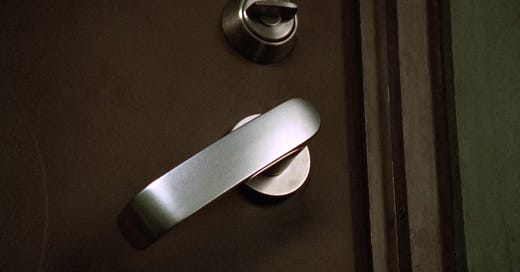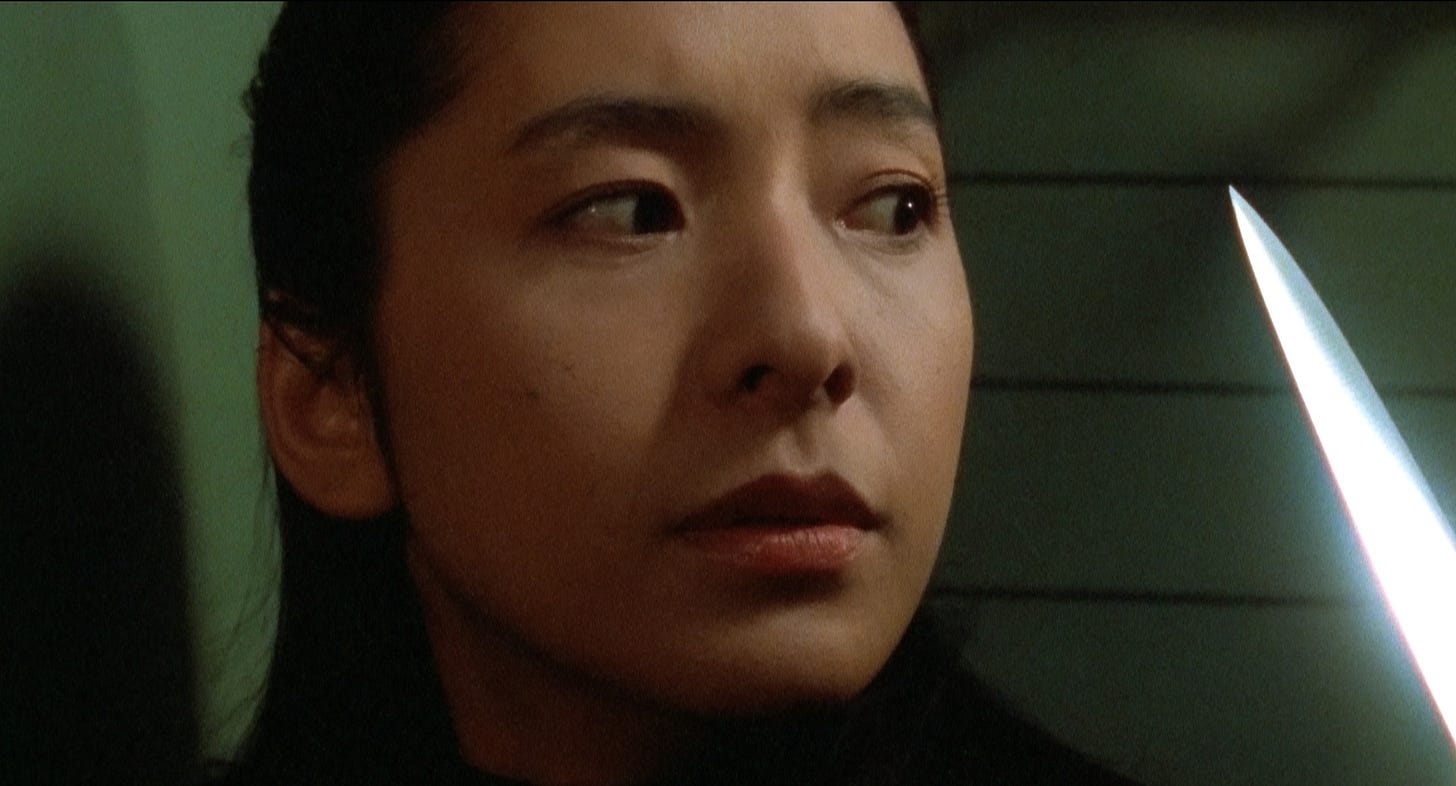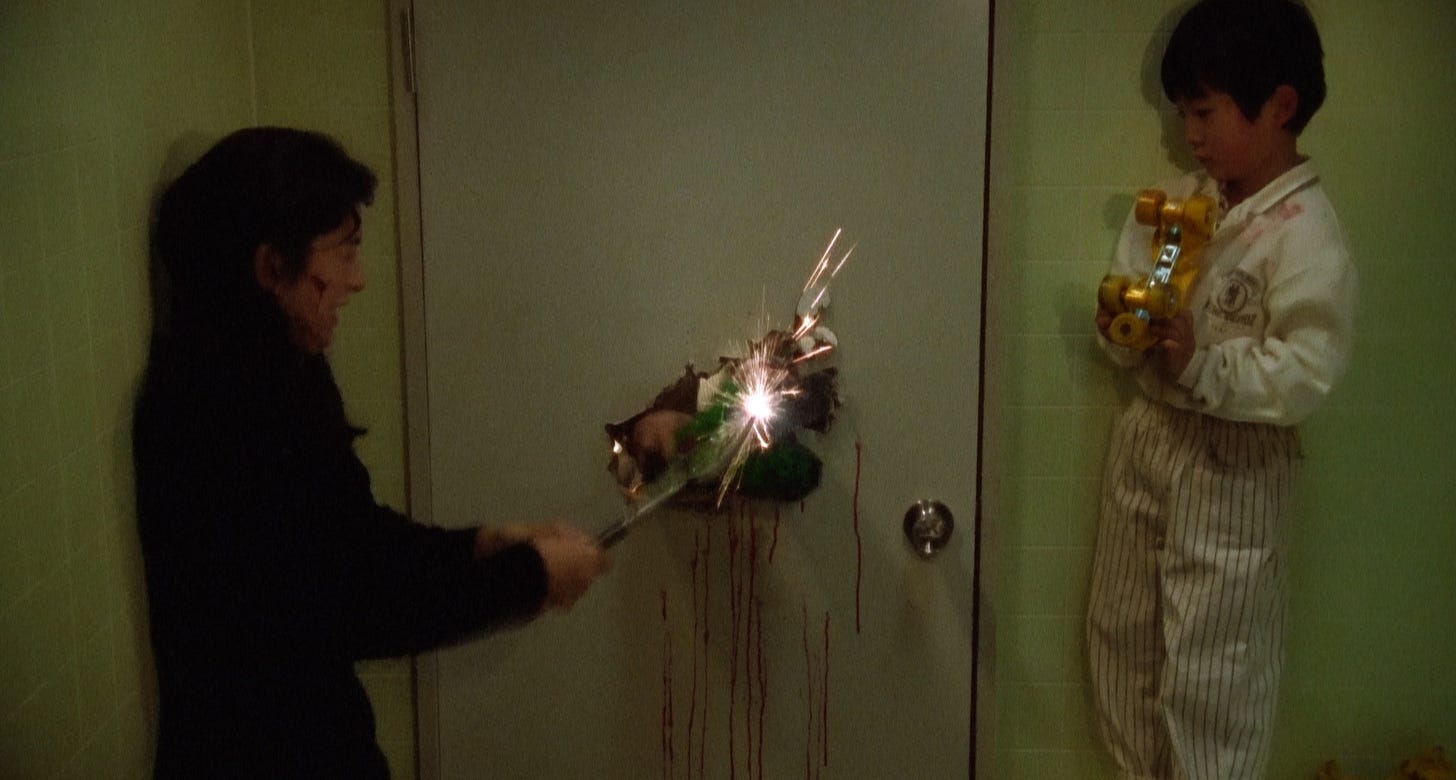Spoilers for Door (1988). Trigger warnings for discussions of stalking and sexual harassment
For ten years The Director’s Company gave young Japanese directors an outlet outside of the major studio system to develop their skills without many of the restrictions. It would produce the debut features of directors such as Kiyoshi Kurosawa (who went on to direct Cure and Pulse). It also facilitated a move away from pink films for Banmei Takahashi.
During his time with The Director’s Company, Takahashi would direct a home invasion film that received little attention outside of its domestic market, yet stands out as an often bizarre, hugely entertaining example of the genre.
In Door, Yasuko Honda (played by Takahashi’s wife Keiko Takahashi) is a housewife who becomes increasingly frustrated with spam callers and door-to-door salesmen. When one particularly overzealous salesman attempts to pass a leaflet through the partly open door, she slams his hand in the door.
The salesman (Daijirô Tsutsumi), infuriated by the assault begins a targeted campaign of sexual harassment, phone calls and stalking. However, all of this follows a familiar pattern, even if it does conclude with an over-the-top barrage of violence in the closing twenty minutes. None of the true horror comes from the actions of the salesman.
Instead, the horror comes from the isolation of Yasuko, despite her living in what appears to be a busy tenement block. Cinematographer Yasushi Sasakibara goes to great lengths to highlight the size of the building, and there are key moments to show that even before the stalking begins, Yasuko is always being watched.
One of these happens right at the start when she steps out to take her son Takuto (Takuto Yonezu) to school. She drops a trash bag at the bins, and we see another person lift the bag and take it away. When Yasuko returns home, the bag has been left outside her door. This, we find out later, is because it was the wrong day to put the trash out, and someone within the building not only watched her closely enough to know it was her rubbish but also went to the effort of returning it to the apartment.
But this isn’t watching Yasuko for her own benefit, it is for some vaguer overall benefit to the apartment block itself. Because when she does slam the hand of the salesman in the door, there is no one there to help her.
It’s a stunning shot, taken from overhead so that we clearly see the partition between Yasuko and the salesman. We see how thin it is, as he kicks the door furiously and Yasuko does all she can to hold the door firm.
How does no one hear this assault in a busy building? Well, the answer is that they do. At one point an old woman steps out of her apartment to see what the noise is about but simply stares at the salesman before going back inside.
On the surface, the overhead camera angle is simply a stylistic shot. Something that makes what could have easily been a dull, or perhaps even silly scene, into something more sinister. However, it informs so much about the ending, when the salesman breaks into Yasuko’s home and holds her and her son hostage.
The final 20 minutes of Door is a frenetic cat-and-mouse chase through the tight confines of the apartment. Yasuko throws everything she can at the intruder; smashing objects over his head, tipping over furniture and stabbing him with kitchen utensils, all the while calling for help. Help that never arrives.
And we know that help won’t arrive, which increases our investment in Yasuko’s survival. We know that the neighbours will ignore her because no one has come to her aid so far. We know that her husband (Shirô Shimomoto) is away on business and that the police have only the slightest interest in helping Yasuko against what they believe to be a case of sexual harassment rather than assault.
Door is a home invasion film and a scary one at that, but it is also an interesting examination of isolation. Despite being surrounded by apartments, Yasuko has no friends she can call upon. The only person she speaks to – besides her husband and child – is a friend over the phone, suggesting that she does not live in the same building. The paper-thin walls of the apartments are enough to completely blockade her from the outside world, and give those around her enough deniability to not get involved.
Director: Banmei Takahashi
Writers: Banmei Takahashi, Ataru Oikawa
Starring: Keiko Takahashi, Daijirô Tsutsumi, Shirô Shimomoto, Takuto Yonezu










Hey, I’ve started an account where I collect some out of context moments of great films. Just wanted to share it with the cinephiles around here : https://substack.com/@pariscinema?r=1x6h4r&utm_medium=ios&utm_source=profile